Stories about...Externally Funded Projects
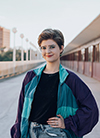 Undergrads Experience Materials Science Research Courtesy of the I-MRSEC REU
Undergrads Experience Materials Science Research Courtesy of the I-MRSEC REU
June 16, 2021
Ten undergraduate students who signed up for the I-MRSEC (Illinois Materials Research Science and Engineering Center) virtual Research Experience for Undergraduates (REU) are spending the summer of 2021 discovering what research is like. In addition, they're being given the opportunity to build a network plus gain skills that they'll most likely find helpful down the road—whether they go into a career in science or not. Participants are also hopefully getting a better idea of what they want to do career-wise. Some may even be determining whether grad school might be in their future, or if research—specifically Materials Science research—might be the career for them.
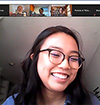 I-MRSEC’s Virtual REU Undergrads Gain Knowledge, Skills, and Insights into Their Future Careers
I-MRSEC’s Virtual REU Undergrads Gain Knowledge, Skills, and Insights into Their Future Careers
August 7, 2020
Although the COVID-19 pandemic precluded I-MRSEC (the Illinois Materials Research Science and Engineering Center) from hosting the residential REU (Research Experience for Undergraduates) intended for summer 2020–—undergraduate students physically conducting research in Illinois labs—the eleven undergrads from all across the U.S. who participated appeared to have benefitted immensely. What kind of impact did participating in the I-MRSEC REU’s virtual counterpart have on the undergrads? In addition to conducting cutting-edge research in one of Illinois’ labs—virtually—mentored by an I-MRSEC faculty member and/or a Ph.D or post-doc researcher, they presented their results at I-MRSEC's Undergraduate Symposium. Plus, students also gained other benefits from the REU: some became adept at using new software; others gained confidence; still others gained a clearer understanding of the direction they plan to go careerwise—including materials science research—all thanks to I-MRSEC’s Virtual REU.
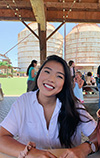 I-MRSEC’s Virtual REU to Expose Undergrads to Research, Provide Training in Needed Skills
I-MRSEC’s Virtual REU to Expose Undergrads to Research, Provide Training in Needed Skills
May 29, 2020
Eleven undergraduate students are participating in the I-MRSEC (Illinois Materials Research Science and Engineering Center) virtual REU this summer from May 27th through July 31st, 2020. However, due to the COVID-19 pandemic, the REU isn't business as usual (in-person interactions with researchers while conducting research in one of Illinois’ state-of-the-art labs). However, the students will still gain valuable experiences. They'lll still have face-to-face interactions with researchers (via Zoom?) while conducting research; they'll still be collecting and analyzing their data and presenting their results. And just like last year’s program, they will still do networking, plus gain other useful information and skills related to research and preparing for a career in STEM…all done virtually!
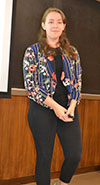 I-MRSEC REU Teaches Carmen Paquette a Lot About Magnetism, Research, and Herself
I-MRSEC REU Teaches Carmen Paquette a Lot About Magnetism, Research, and Herself
August 23, 2019
Carmen Paquette had a lot of takeaways from her experience in the I-MRSEC (Illinois Materials Research Science and Engineering Center) Research Experience for Undergraduates (REU) this past summer. For one, the rising junior, a Material Science and Engineering major at the Illinois Institute of Technology in Chicago, learned a lot about both magnetism and material science. She also discovered what engineering research is like—lots of iterations and lots of thinking outside the box. She also grew personally, learning not to procrastinate, but to “Just do it!” And while she didn’t necessarily figure out if grad school is in her future, she did decide to just follow her heart and go full STEAM ahead when it comes to the things she’s passionate about.
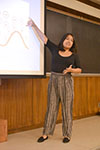 I-MRSEC REU Exposes Undergrads to Materials Science, Research, and What Grad School Is Like
I-MRSEC REU Exposes Undergrads to Materials Science, Research, and What Grad School Is Like
August 20, 2019
For ten weeks this past summer, eleven undergraduate students from all over the US showed up at Illinois to participate in I-MRSEC’s second Research Experience for Undergraduates (REU) program. As part of the experience, they not only conducted a research project, but they completed a paper and gave a final presentation. Of the 11 students, five were from Illinois (mostly from the Chicago area); six were from out of state (Tennessee, Oregon, Texas, and California). And although none of them are currently Illinois students, after experiencing what cutting-edge research at Illinois is like, some will most likely be applying to grad school here.
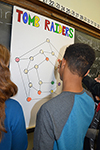 GeoJam Helps Edison Eighth Graders Discover That Mathematics Is Fun
GeoJam Helps Edison Eighth Graders Discover That Mathematics Is Fun
December 20, 2018
On Friday, December 14th, 26 Illinois undergraduate students who intend to one day teach mathematics visited Edison Middle School in Champaign as part of the Curriculum and Instruction (C&I) Department’s annual math outreach, GeoJam. In addition to allowing the school's 220 or so eighth graders to explore a variety of ways that mathematics can be used outside of their math class at school, through the event they discovered that teamwork can be helpful in problem solving. Plus, and probably most importantly, they also learned that math can be fun. This year’s GeoJam was organized by Gloriana Gonzalez, a C&I Professor in Math Education who was helping organize the event for the second year in a row, and C&I instructor Adam Poetzel, whose instructional focus is on the preparation and training of pre-service mathematics teachers to effectively teach diverse K–12 students..
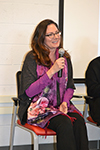 How Tweet It Is! I-MRSEC Workshop Helps Scientists Incorporate Twitter into Their Scientific Communication Repertoire
How Tweet It Is! I-MRSEC Workshop Helps Scientists Incorporate Twitter into Their Scientific Communication Repertoire
November 20, 2018
Are you passionate about communicating science, but a bit behind on the latest technology, like Twitter? Do you have an inkling what Twitter is and does, and are interested in finding out about how Twitter might be helpful to you as a scientist? Do you have a Twitter account, but haven’t quite gotten the hang of how to use it? A number of university folk who fit in one or more of the above categories showed up at the Physics Interaction Room on November 14th for a workshop: “Social Media for Scientists: #Tweetyourscience.” As the title implies, workshop participants hoped to find out more about how they might use social media—especially Twitter—to communicate science. Sponsored by I-MRSEC (Illinois Materials Research Science and Engineering Consortium), Beckman Institute 21st Century Scientists, and Illinois’ Graduate College, the workshop featured a talk by the Grad College’s Mike Firmand, a panel of researchers from Illinois’ science community who have a good Twitter following, plus some small groups based on participants’ level of Twitter expertise.
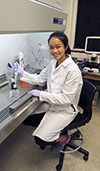 ResearcHStart Promotes the Next Generation of Scientists by Exposing Local High School Students to Cancer Research
ResearcHStart Promotes the Next Generation of Scientists by Exposing Local High School Students to Cancer Research
May 9, 2018
When the American Cancer Society discontinued its program exposing high school students to cancer research in laboratories, philanthropists Deborah and Ira Cohen, he's an Illinois CS alumni and she's a huge advocate for cancer research, said to each other: “I wonder if we could do something about that?” So they did. In 2015, they began researcHStart, a program which allows Illinois high school students to discover what a career in cancer research might be like via authentic research experiences in cutting-edge laboratories at Illinois and other campuses in the state.
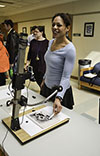 I-MRSEC: Creating a Multidsciplinary Materials Research Community
I-MRSEC: Creating a Multidsciplinary Materials Research Community
March 15, 2018
"The more that people understand the scientific basis of the world and of their lives and of what people are doing and researching and care about, the more we care about each other and the more we support each other." – Nadya Mason
Begun in September 2017, I-MRSEC (Illinois Materials Research Science and Engineering Center), a new NSF-funded center, seeks to create a community around multidisciplinary materials science research, recruiting and educating the next generation of researchers, including diverse students, and informing the general public through outreach. Funded through NSF’s Division of Materials, the Center will receive $16 million over the six years of the grant, with the possibility of being renewed.
 NCSA’s New CIP Internship Program Trains Cyberinfrastructure Professionals
NCSA’s New CIP Internship Program Trains Cyberinfrastructure Professionals
December 12, 2017
According to NCSA’s Daniel Lapine, the number of qualified people who have experience working in advanced cyber-infrastructure (CI) is rather limited. So over the next three years, he and some folks at NCSA hope to do something about it. As part of the NSF-funded CyberTraining CIP: NCSA Internship Program for CI Professionals, they are seeking to add to the nation’s pool of qualified, advanced cyberinfrastructure professionals.
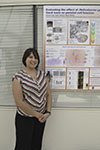 Vet Med’s Summer Research Training Program Exposes Participants to What Careers in Veterinary Research Might Entail
Vet Med’s Summer Research Training Program Exposes Participants to What Careers in Veterinary Research Might Entail
October 31, 2017
Every year since 2003, the Summer Research Training Program (SRTP) has hosted 14–25 veterinary school students from the University of Illinois to conduct a research project for 10 weeks over the summer. The goal of the program? To facilitate the career progression of veterinary medicine students who have the ability and motivation to become research scientists. Each of the 14 participants who participated was paired with a mentor from the Illinois College of Veterinary Medicine and helped design a research project, which they participated in from beginning to end. In addition to research, they also explored future available careers, trained in research ethics, and learned about proper scientific writing. Run by Professor Lois Hoyer, the SRTP lasted from May 22nd to July 28th.
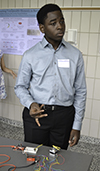 POETS’ Education Program Introduces Students of All Ages to Interdisciplinary Research in Electro-Thermal Systems
POETS’ Education Program Introduces Students of All Ages to Interdisciplinary Research in Electro-Thermal Systems
August 31, 2017
In addition to cutting-edge research in electro-thermal systems, the NSF-funded POETS (Power Optimization for Electro-Thermal Systems) Engineering Research Center has educational programs that expose students (as well as the teachers) to POETS’ research via educational activities, research, and courses that foster interdisciplinary collaboration and expose learners to the unique research that takes place in the Center.
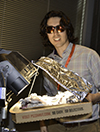 POETS Seminar, ENVISION, Seek to Get Grad Students Hooked on Outreach
POETS Seminar, ENVISION, Seek to Get Grad Students Hooked on Outreach
April 26, 2017
The objective of the contest? To use a pizza box to build a solar oven capable of heating up a marshmallow to the hottest temperature possible. But in a room full of 50 or so talented and competitive engineering graduate students from four POETS universities, the challenge wasn’t so much the design itself. It was about finishing first and getting one of the coveted, optimal spots in front of a limited number of lights!
FULL STORY
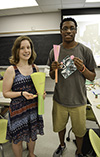 Young Scholars Program Exposes Local High School Students to Research, the University
Young Scholars Program Exposes Local High School Students to Research, the University
August 2, 2017
Instead of spending their summers working at McDonalds, or lounging by the pool, twelve rising juniors and seniors from Centennial and Central High Schools in Champaign spent the summer learning about things like photon quantum mechanics, dark matter detectors, and the biochemistry of swimming bacteria. Part of the Young Scholars Program, a new, six-week summer research opportunity, the students got to experience authentic, cutting-edge research in some of Illinois' premier research labs. Begun by the Nuclear Physics Laboratory in the Physics Department, who joined forces with the POETS Engineering Research Center to broaden and strengthen the program, Young Scholars received funding from multiple sources: ICR funds from the NSF NPL grant, the NSF-funded POETS, the Physics Department itself, and the College of Engineering (which provided funding for one student). The fledgling program was begun to help students discover what research is actually like, determine if research might be in their futures, plus give them an idea of what college is like.
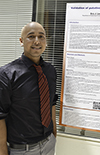 Vet Med Students Gain Knowledge, Skills During Summer Research Training Program
Vet Med Students Gain Knowledge, Skills During Summer Research Training Program
August 24, 2016
This past summer, 14 Illinois Veterinary Medicine (Vet Med) students participated in the 2016 College of Veterinary Medicine Summer Research Training Program, which provided students a chance to get hands-on research experience in their prospective fields and also gave many of them a better idea of what they want to pursue regarding their future careers. Over the course of the summer (May 23–July 29, 2016), participants not only learned a great deal about the area they were researching, developed new skills and techniques which will be beneficial both in their college and professional careers, but grew personally as well.
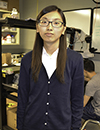 POETS REU Helps Illinois Undergrad Sabrina Yin Choose Her Career Path
POETS REU Helps Illinois Undergrad Sabrina Yin Choose Her Career Path
August 22, 2016
Most REU (Research Experience for Undergraduates) participants have an opportunity to conduct research for 8–10 weeks during the summer. Their experience then culminates in a poster session—the highlight of the summer—which gives the undergrad the chance to hone his or her skills while creating a research poster and reporting results. However, POETS REU participant Sabrina Yin, a rising junior majoring in Mechanical Engineering at Illinois, is doing more than just a couple of months worth of research in the summer. Yin began working in researcher Nenad Miljkovic’s Energy Transport Research Lab in March, participated in the REU this summer, and will continue her research in the lab this fall and beyond. “This research project that I’m working on will run for another two years approximately. So I’ll be staying in the lab to help out with the research,” she explains.
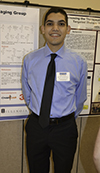 2016 Chemistry REU Offers Undergraduate Students a Glimpse of Grad Life
2016 Chemistry REU Offers Undergraduate Students a Glimpse of Grad Life
August 16, 2016
This summer at Illinois, five undergraduate students were chosen to be a part of the Chemistry REU (Research Experience for Undergraduates) program to get a glimpse of what research in graduate school looks like. Allison Fout, the PI for this REU, which currently is solely funded by 3M, said that out of 270 applicants, only five were chosen. According to Fout, applicants were selected based upon the following criteria: “Their grades, their letters of recommendation, their experience. (You could really gain experience by coming here)" she adds. Plus, she indicates that the final criteria was: "students that were interested in pursuing chemistry in the future. All of those things were part of what we were looking at.”
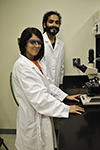 Undergrads in Bioimaging REU Experience What Research, Graduate School Is Like
Undergrads in Bioimaging REU Experience What Research, Graduate School Is Like
July 29, 2016
Ten undergraduate students from around the country participated in the NSF-funded Bioimaging Research Experience for Undergraduates (REU). Working alongside researchers in Illinois labs, they discovered the exciting world of bioimaging research, got a taste of what graduate school is like, and some might have discovered what they want to do for the rest of their lives.
 Wendy Reyes Learns Life Skills in Bioimaging REU
Wendy Reyes Learns Life Skills in Bioimaging REU
July 29, 2016
When rising junior Wendy Reyes spent the summer doing research in Professor Michael Insana’s Ultrasonic Imaging Lab as part of the 2016 Bioimaging REU, she learned a lot.She learned some research skills: how to train software to recognize cancer in the images of breast tissue.
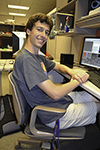 Bioimaging REU's Matt Kavanaugh Experiences Cancer Research at Illinois
Bioimaging REU's Matt Kavanaugh Experiences Cancer Research at Illinois
July 29, 2016
Matt Kavanaugh had originally applied to Illinois as an undergraduate, but finances prevented him from coming here. So he matriculated to the University of Kansas, where the rising junior is majoring in Chemical Engineering with a concentration in Biomedical. However, when searching for something productive to do over the summer, he came across the NSF-funded Bioimaging Research Experience for Undergraduates (REU) at Illinois.
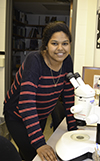 VInTG IGERT Inspires Ph.D. Student Lynette Strickland to Choose a Career in Research
VInTG IGERT Inspires Ph.D. Student Lynette Strickland to Choose a Career in Research
May 2, 2016
How did a little girl who had never been further than her home state of Texas and dreamed of being a veterinarian end up a researcher at Illinois, who also spends large blocks of time in Panama and is passionate about studying, in particular, the colorful Chelymorpha, or tortoise beetle? Lynette Strickland, an Animal Biology Ph.D. student who works in the lab of Illinois researcher Carla Caceres, credits the NSF-funded VInTG (Vertically Integrated Training with Genomics) IGERT.
FULL STORY
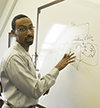 POETS Seeks to Change the Attitudes, Shape of Students in the STEM Pipeline
POETS Seeks to Change the Attitudes, Shape of Students in the STEM Pipeline
March 18, 2016
Andrew Alleyne, PI of the NSF-funded Center for Power Optimization of Electro-Thermal System (POETS), says the Center’s educational components are “all hypothetical at this point” and just “plans in people’s heads.” However, his plans and those of POETS’ Co-Directors of Education, Fouad Abd-el-Khalick (K-12 students) and Phil Klein (undergraduate/ graduate students), and Education Coordinator Joe Muskin appear to be well thought out and seek to strategically strengthen the education of targeted populations along the STEM pipeline.
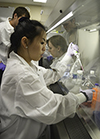 Bioengineering Undergrads Build Biobots in New BIOE 306 Course
Bioengineering Undergrads Build Biobots in New BIOE 306 Course
December 16, 2015
Biobots. The word smacks of scientific breakthroughs in the distant future, or the subject matter of some futuristic, sci-fi movie. But Illinois researchers are currently building and studying biobots as part of their research in this emerging field. However, they're not the only ones. This past semester, Illinois' Bioengineering department piloted a brand new course, BIOE 306, BioFabrication Lab, that teaches undergraduate students how to build them too. Developed as part of the NSF-funded EBICS (Emergent Behaviors of Integrated Cellular Systems) Science and Technology Center, the course distilled down cutting-edge EBICS research and initiated eight Bioengineering juniors and seniors into the mysteries of building with biology. In addition, the idea for this class was developed in part due to the Illinois Innovation Prize, which emphasized the need to teach the next generation of engineers and scientists how to "build with biology."
FULL STORY
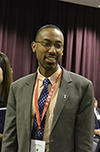 POETS, New NSF Center at Illinois, Poised to Revolutionize Electro-Thermal Systems
POETS, New NSF Center at Illinois, Poised to Revolutionize Electro-Thermal Systems
October 19, 2015
"The new Center...uniting expertise across disciplines, will focus research on what truly is possible and achievable rather than working within the limitations of what currently exists. And what better place to do it than the University of Illinois?” –University of Illinois President Timothy Kileen
Marking the official beginning of the $18.5 million, NSF-funded POETS (Power Optimization for Electro-Thermal Systems) Engineering Research Center, National Science Foundation (NSF) and University leaders, POETS collaborators, and interested members of the University community attended the October 15, 2015 “Kickoff Event.” Headed up by PI Andrew Alleyne, Ralph & Catherine Fisher Professor in Mechanical Science and Engineering, the Center’s goal is to improve the power density of next generation electro-thermal systems.
FULL STORY
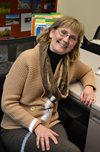 Center to Study the Effects of Toxins on Children, Then Educate the Public
Center to Study the Effects of Toxins on Children, Then Educate the Public
March 19, 2014
Like most folks these days, I make an effort to be green. However, I'm not a fanatic. But when I-STEM's director, Lizanne DeStefano, announced one day that, as a result of evaluating a new grant studying the effect of toxins on children, she had gone home and thrown out all of her Tupperware, this reporter's curiosity was piqued, and as a result of chatting with Susan Schantz about her project, I may mend my ways.
Co-funded by the National Institute of Environmental Health Sciences (NIEHS) and the Environmental Protection Agency (EPA), a 5-year, $7.6 million grant was recently awarded to Illinois' Children's Environmental Health Research Center. The project, "Novel Methods to Assess the Effects of Chemicals on Child Development," is studying the effects of phthalates and BPA on children.
FULL STORY
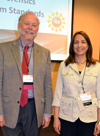 Campus Experts to Develop a Digital Forensics Undergraduate Curriculum
Campus Experts to Develop a Digital Forensics Undergraduate Curriculum
May 31, 2013
Want to become a digital detective? There's a new course on campus this fall: CS 498, Special Topics. Despite the course's nondescript rubric, it invites students from a number of disciplines, including computer science, criminal justice, and even law, to investigate the exciting, up-and-coming field of Digital Forensics.
FULL STORY
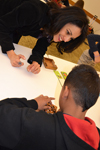 Noyce Scholars: Taking Student-Centered Math to High-Needs Schools
Noyce Scholars: Taking Student-Centered Math to High-Needs Schools
May 14, 2013
"Noyce is probably the best decision I've made professionally, and as far as my college career goes." Liz Denz
Liz Denz has wanted to teach math ever since her freshman year in high school. And Illinois' NSF-funded Noyce program, which provides scholarships for talented mathematics majors who want to become K-12 math teachers, is helping to make her and other Noyce scholars' dreams come true.
FULL STORY
 Noyce: Training Math Teachers Who Foster Equity in the K-12 Classroom
Noyce: Training Math Teachers Who Foster Equity in the K-12 Classroom
May 2, 2013
This is Rochelle Gutiérrez' hope for her Noyce scholars when they finally become K-12 math teachers: that when they look at themselves in the mirror every day, they will be able to say, "I'm doing what I wanted to do when I went into education."
FULL STORY
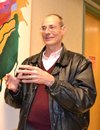 IGERT Trains Students at the Intersection of Neuroscience and Engineering
IGERT Trains Students at the Intersection of Neuroscience and Engineering
December 6, 2012
"We're trying to develop a culture and a community of people here on campus that are interested in the intersection of neuroscience and engineering."
According to program coordinator Pat Grenda, this is the goal of the Neuroengineering IGERT at Illinois. Short for "Neuroengineering: A Unified Educational Program for Systems Engineering in Neuroscience," the five-year Ph.D. program is funded by a National Science Foundation Integrative Graduate Education and Research Traineeship (IGERT) grant. In its fourth year, the IGERT currently has 45 students enrolled in four cohorts.
FULL STORY
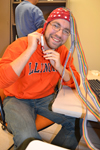 Neuroengineering IGERT Students Experience Interdisciplinary Research
Neuroengineering IGERT Students Experience Interdisciplinary Research
One student wants to discover how the brain enables complex thought, such as philosophy. Another wants a field rewarding enough to get him out of bed and to work every morning. Another student, who heard about the IGERT program while jogging, finds the psychology-engineering intersection intriguing and the engineering tools crucial to his work. Still another saw the IGERT as an opportunity to acquire resources, knowledge, and connections in the field of engineering that she wouldn't have had otherwise. No matter why students chose the Neuroengineering IGERT at Illinois, they find interdisciplinary research at the intersection of neuroscience and engineering to be challenging, yet exciting.
FULL STORY
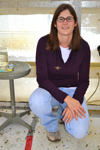 VINTG IGERT Students Receive Outside-of-the-Box Training in Genomics
VINTG IGERT Students Receive Outside-of-the-Box Training in Genomics
November 16, 2012
Nine new doctoral students arrived on campus this fall to receive a new kind of training in genomics that "thinks outside the box." The premise of this training model: to produce a new generation of biologists on the cutting edge of genome-enabled science, who can specifically address how genomes interact with the environment to create diversity.
FULL STORY
 S-STEM Grant to Provide Scholarships for Biology, Chemistry, & Math Merit Students
S-STEM Grant to Provide Scholarships for Biology, Chemistry, & Math Merit Students
July 2, 2012
She wants to study chemistry at Illinois. She's familiar with the university because her mom went to school here. But because she lives out of state, it's too expensive. So instead, she's been going to a local college. However, she's been quite discouraged, because she wants to come to Illinois.
FULL STORY
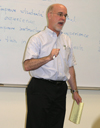 Illinois' Engineering to Revamp Targeted Undergraduate Courses
Illinois' Engineering to Revamp Targeted Undergraduate Courses
May 18, 2012
Despite being highly-ranked nationally, the College of Engineering is not content to rest on its laurels. Striving to improve aspects of its undergraduate education programs by specifically targeting large courses (sometimes dubbed by students as "weed-out courses"), the College recently initiated the Strategic Instructional Initiatives Program (SIIP). Its goal: to renovate specific undergraduate courses to improve student engagement and learning outcomes.
STORY
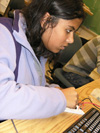 ECE 101 Engages Students by "Harnessing" Their Interests
ECE 101 Engages Students by "Harnessing" Their Interests
November 4, 2011
Illinois' General Education requirements are often viewed by students and teachers alike as exactly that—requirements to be gotten out of the way and checked off the list. To view these classes as opportunities to learn and grow is the perspective of the minority, and a few in this minority are doing something about it. At least two teachers in the Department of Electrical and Computer Engineering are trying to change the way students and educators view these basic requirements and are offering a class that pushes students to go beyond the minimum.
STORY
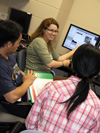 Amos's Atomic Microscope Gives Students Close-Up Look at Cells
Amos's Atomic Microscope Gives Students Close-Up Look at Cells
August 26, 2011
A few adventurous young bioengineers are taking cell research to a whole new level—the atomic level. University of Illinois bioengineering students now have access to a new tool for looking at cells called an Atomic Force Microscope (AFM). In March, the Roy J. Carver Charitable Trust provided the $290,000 machine, in the form of a grant, to the university and to bioengineering lecturer Jennifer Amos. Amos will lead a new class this fall called “The Bioreactor Lab” that will focus on teaching students about the use Atomic Force Microscopy in bioengineering.
STORY
 New Center for Agricultural, Biomedical, and Pharmaceutical Nanotechnology (CABPN) To Target Biotechnology
New Center for Agricultural, Biomedical, and Pharmaceutical Nanotechnology (CABPN) To Target Biotechnology
February 10, 2011
The new Center for Agricultural, Biomedical, and Pharmaceutical Nanotechnology (CABPN) is an NSF Industry/University Cooperative Research Center designed to enable discovery and innovation through collaboration. CABPN's mission is to conduct industrially-relevant fundamental research into applications of nanotechnology in the fields of drug development, agriculture, and medical technology; to facilitate technology transfer to industry; and to enhance graduate education and research.
FULL STORY
 Chemistry Receives Funding to Improve Services to Undergraduate Students
Chemistry Receives Funding to Improve Services to Undergraduate Students
Get students interested in chemistry! While the goal of Chemistry at Illinois may be simply stated, to achieve it, the Department has taken on a task that is not so simple: to design and implement a new undergraduate chemistry curriculum. Besides fostering student interest in chemistry, the Department hopes to give students a solid foundation in chemical competencies, attract under-represented students to STEM majors, and provide students in introductory chemistry with a knowledge of chemical research problems.
STORY
 ITI in first year of NSF grant as "Research Experiences for Undergraduates" (REU) Site
ITI in first year of NSF grant as "Research Experiences for Undergraduates" (REU) Site
October 15, 2009
The Information Trust Institute (ITI) at the University of Illinois at Urbana-Champaign has received a $357,000 award from the National Science Foundation (NSF) to create a “Research Experiences for Undergraduates” (REU) site.
STORY













.jpg)
















